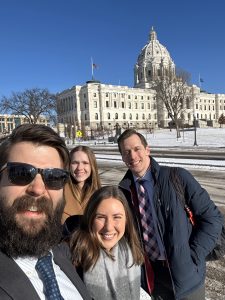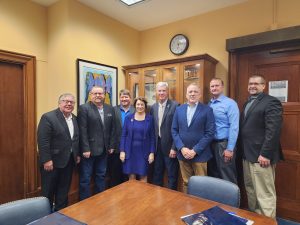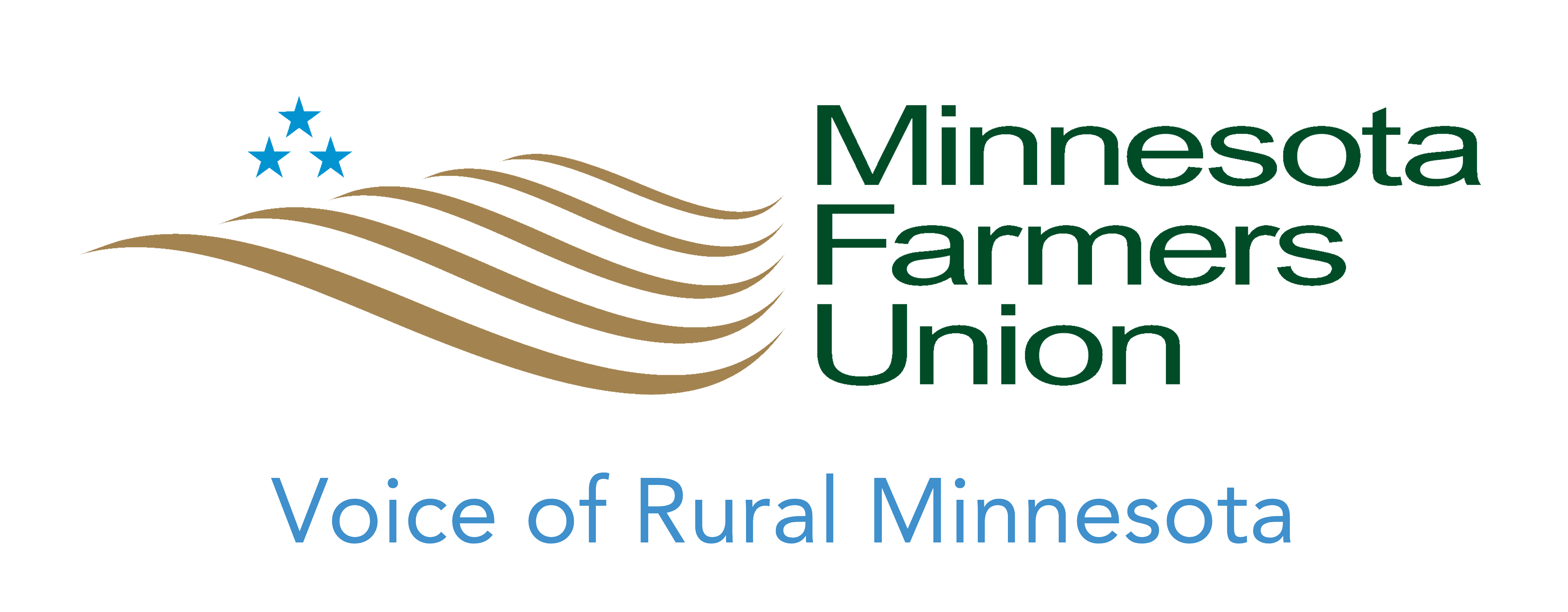Legislative Update: 2025 state legislative session starts
Noon on Tuesday, Jan. 14, marked the start of the 2025 legislative session. Though the start in the House was marked by consternation, controversy and impending court challenges, the end will require unity. Lawmakers will need to come together around a bipartisan two-year budget agreement that provides renewed funding for government functions from meat inspections to road construction. As with every day of session, MFU’s legislative team was at the Capitol meeting with lawmakers about MFU’s grassroots policy priorities and making the case for a final package that benefits family farmers and rural communities.

MFU staffers Stu Lourey, Amber Findlay, Lisa Holm and Justin Stofferahn at the state Capitol on Jan. 14, the first day of the 2025 session.
You can find our 2025 Legislative Priorities one-pager at mfu.org/legislation. This builds on newly approved policy and Special Orders of Business passed at MFU’s annual convention as they relate to the state legislature.
“As a grassroots organization, we’ll be focused on priorities established by members at our state convention in November,” said MFU President Gary Wertish in a release leading into session. “At a basic level, lawmakers are going to have to come together to pass a new two-year budget for our state. And we want to help make sure that it works well for farm families and others in rural Minnesota—continuing strong investments in agriculture programs, ensuring farm families have access to care and helping young people build lives in agriculture.”
Session is set to end on May 19 and a budget must be finalized by June 30 to avert a shutdown of state government.
How did the session start?
In the Senate
There were two very different stories on either side of the Capitol rotunda.
The Senate, which is currently tied 33-33 after Sen. Kari Dziedzic, DFL-Minneapolis, passed away in late December, reached a power sharing agreement that allowed the DFL and Republican Caucuses to convene and start their work right away. The agreement, which mirrors the previous power sharing agreement negotiated by the House caucuses, was passed by the full Senate and stipulates that:
- Each caucus leader will appoint a co-presiding officer; caucus leaders will agree who will convene each day.
- Each committee has joint chairs, with gavel sharing determined by the chairs.
- Equal representation of DFL and GOP members on committees.
- No changes to Senate rules through 2025.
The agreement will be in place until the special election in Senate District 60 is held and one caucus—likely the DFL in the heavily democratic district—wins 34 votes to break the tie.
“I want to thank Sen. Johnson, DFL and Republican leaders, and our dedicated staff for tireless efforts to create a temporary organizing structure that will be fair to both caucuses and productive for the people of Minnesota,” said DFL Caucus Leader Erin Murphy, DFL-St. Paul. “Under these terms, we can begin the work of 2025, avoid gridlock and uphold the best of this institution.”
“Starting the 2025 session with a 33-33 tie means we all have an opportunity to build trust and respect as we navigate these circumstances,” said Republican Caucus Leader Mark Johnson, R-East Grand Forks). “I want to thank Sen. Murphy and both caucuses for their work to recognize a balanced Senate structure that not only reflects the makeup of the Senate, it honors the collaborative and bipartisan work that Minnesotans expect of their legislature.”
A bipartisan group of senators who helped negotiate the deal also put out statements applauding the agreement and the orderly start to session.
In the House
In the House on the other hand, Republicans walked away from the power sharing agreement they negotiated with DFLers after a district court ruled that the winning DFL candidate in a Roseville seat didn’t live in his district. This gave Republicans a temporary one seat margin (67-66). They then announced they would use to elect a Speaker, organize committees and even oust Rep. Brad Tabke, DFL-Shakopee,—moves that would last through the 2025-26 biennium.
After many hours of negotiation and after a court ruled that Tabke won his seat, House DFLers were unable to secure a new commitment from Republicans that would ensure Tabke would be seated and that they would return to a power sharing agreement when the body returned to a 67-67 tie. As a result of this, House DFLers chose not to show up to the Capitol, denying Republicans the quorum necessary to convene the session.
As expected and upon taking the role of members present, Secretary of State Steve Simon ruled that there was no quorum and that the House would be unable to conduct business. He promptly adjourned the session until noon Wednesday.
However, once Secretary Simon left, Rep. Paul Anderson, R-Starbuck, took the dais, contended that Secretary Simon was mistaken, and claimed Republicans had a quorum with 67 members given the unfilled seat in Roseville. House Republicans then held votes to elect Rep. Lisa Demuth, R-Cold Spring, as speaker and approve rules for the upcoming biennium.
House DFL leadership then slammed Republicans and hotly contested the constitutionality of these moves. They also committed to quickly filing a complaint with the Minnesota Supreme Court who will serve as the final authority on the legitimacy of this convening.
Secretary Simon also release a statement following the afternoon’s proceedings, stating that “68 members are required for the House to conduct business. I anticipate that the courts will provide clarity both on that issue and on the understanding that the person who holds the Secretary of State’s office is the presiding officer until a Speaker is legally elected – an event which has not yet occurred.”
DFLers also confirmed that they’ll continue negotiating, but won’t show up and provide quorum until an agreement on seating Rep. Tabke and sharing power in the event of a tied House are reached.
Important dates
We don’t know when or if they’ll reach an agreement and we don’t know how soon the courts could react to a challenge about quorum. But we do know some other important dates to watch through session:
- Jan. 16 – Governor’s Budget request. This Thursday, the governor is expected to release his budget request far earlier than usual. Though it’s just a request and lacks details, it will provide an important window into the administration’s priorities for the session. We’ll be sure to share an analysis of provisions relevant to MFU’s priorities.
- Jan. 28 – Special Elections Senate District 60 and House District 40B will be held to determine the final balance of the full legislature. Both are heavily DFL districts and so this election is expected to return the Senate to a one-seat DFL majority and the house to a 67-67 tie.
- Feb. 3 – New members swearing in. After that election, the first day members can be sworn in is the following Monday, Feb. 3.
- Feb. 28 (approximate) – February budget forecast. At the end of February, we’ll receive an update to the November budget forecast, a critical step in defining budget negotiations.
Dates for holiday breaks and the three legislative deadlines are agreed to among caucuses and might not be finalized for some time.
MDA news
While the legislature is getting organized in order to pass a new budget, agencies are still implementing the last one. Big announcements from the Minnesota Department of Agriculture came in recent weeks. They announced the availability of the Beginning Farmer Tax Credit, which provides a tax incentive to farmers who rent or sell ag assets to those in their first 10 years of farming. For sales, this can total up to $50,000 and beginning farmers are also eligible for a tax credit to participate in the Farm Business Management (FBM) program.
In 2023—and as part of a move to expand eligibility and increase the value of individual credits—the legislature capped the total amount of state funding available to the credit at $4 million. Unfortunately, this has meant that the for the first time the program is turning farmers away due to lack of funds. MFU and other ag groups are working with lawmakers to build the case for removing the cap on this nation-leading credit so that every farmer who qualifies can benefit. But for now, the program is first-come, first-served—so be sure to get your application in quickly
MDA also announced a $9.5 million award through the USDA Agricultural Marketing Service (AMS) through which the state will fund nine Regional Food System Infrastructure (RFSI) projects, including expanded local dairy processing, vegetable processing, oat and sunflower milling, and a community kitchen. Congratulations to the MFU members who were a part of this award. And a great example of expanded processing across a variety of products and geographies.
Finally, MDA also announced a new grant opportunity for farmers markets. The new Farmers’ Market Nutrition Assistance Grant was supported by MFU last session and will provide markets support for implementing food assistance programs like Supplemental Nutrition Assistance Program (SNAP) and Market Bucks. MDA has a total of $150,000 for the program and plans to award grants of between $1,500 and $10,000 on a competitive basis. Applications are due on Feb 20.
On the federal level
MFU President Gary Wertish spent the first part of the week in Washington, D.C., for board meetings and took the opportunity to meet with the four Agriculture Committee leaders for the new Congress, including Minnesota’s own Sen. Amy Klobuchar, D-Minn., and Congresswoman Angie Craig, D-2nd District, who both serve as their caucuses’ Ranking Member on their respective ag committees.

NFU Executive Board meets with Sen. Amy Klobuchar, the ranking member on the Senate Agriculture Committee.
Ranking Member Craig released a statement over the weekend criticizing a Republican budget proposal that would make cuts to Farm Bill nutrition, conservation and rural energy programs.
“We are happy to work with Republicans on a bipartisan basis when it’s on behalf of the American people and family farmers,” Craig said in the release. “But . . . Republicans are starting the new year by workshopping a plan to take money from America’s farmers in order to pay for tax breaks for billionaires.”
The budget fight will continue in Washington as the latest continuing resolution passed in late December only runs through March 14. As always, if you have questions, thoughts, or concerns about MFU’s legislative work, reach out to Stu at (320) 232-3047 (C) or stu@mfu.org.
